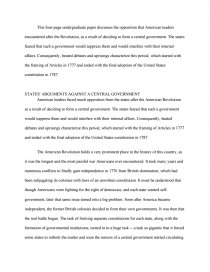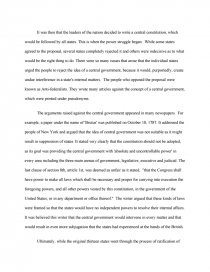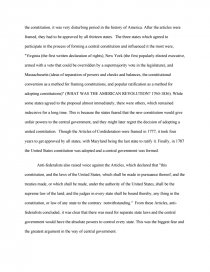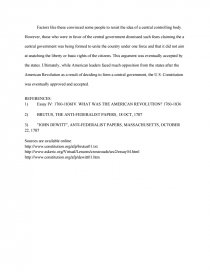States' Arguments Against a Central Government
Essay by review • March 21, 2011 • Research Paper • 1,082 Words (5 Pages) • 1,495 Views
This four-page undergraduate paper discusses the opposition that American leaders encountered after the Revolution, as a result of deciding to form a central government. The states feared that such a government would suppress them and would interfere with their internal affairs. Consequently, heated debates and uprisings characterize this period, which started with the framing of Articles in 1777 and ended with the final adoption of the United States constitution in 1787.
STATES' ARGUMENTS AGAINST A CENTRAL GOVERNMENT
American leaders faced much opposition from the states after the American Revolution as a result of deciding to form a central government. The states feared that such a government would suppress them and would interfere with their internal affairs. Consequently, heated debates and uprisings characterize this period, which started with the framing of Articles in 1777 and ended with the final adoption of the United States constitution in 1787.
The American Revolution holds a very prominent place in the history of this country, as it was the longest and the most painful war Americans ever encountered. It took many years and numerous conflicts to finally gain independence in 1776 from British domination, which had been subjugating its colonies with laws of an unwritten constitution. It must be understood that though Americans were fighting for the right of democracy and each state wanted self-government, later that same issue turned into a big problem. Soon after America became independent, the former British colonies decided to form their own governments. It was then that the real battle began. The task of forming separate constitutions for each state, along with the formation of governmental institutions, turned in to a huge task -- a task so gigantic that it forced some states to rethink the matter and soon the rumors of a central government started circulating.
It was then that the leaders of the nation decided to write a central constitution, which would be followed by all states. This is when the power struggle began. While some states agreed to the proposal, several states completely rejected it and others were indecisive as to what would be the right thing to do. There were so many issues that arose that the individual states urged the people to reject the idea of a central government, because it would, purportedly, create undue interference in a state's internal matters. The people who opposed the proposal were known as Anti-federalists. They wrote many articles against the concept of a central government, which were printed under pseudonyms.
The arguments raised against the central government appeared in many newspapers. For example, a paper under the name of 'Brutus' was published on October 18, 1787. It addressed the people of New York and argued that the idea of central government was not suitable as it might result in suppression of states. It stated very clearly that the constitution should not be adopted, as its goal was providing the central government with 'absolute and uncontrollable power' in every area including the three main arenas of government, legislative, executive and judicial. The last clause of section 8th, article 1st, was deemed as unfair as it stated, "that the Congress shall have power to make all laws which shall be necessary and proper for carrying into execution the foregoing powers, and all other powers vested by this constitution, in the government of the United States; or in any department or office thereof." The writer argued that these kinds of laws were framed so that the states would have no independent powers to resolve their internal affairs. It was believed this writer that the central government would intervene in every matter and that would result in even more subjugation that the states had experienced at the hands of the British.
Ultimately, while the original thirteen states went through the process of ratification of the constitution, it was very disturbing period in the history of America. After the articles were framed, they had to be approved by all thirteen states. The three states which agreed to participate in the process of forming a central constitution and influenced it the most were, "Virginia (the first written declaration of rights), New York (the first popularly elected executive, armed with
...
...



